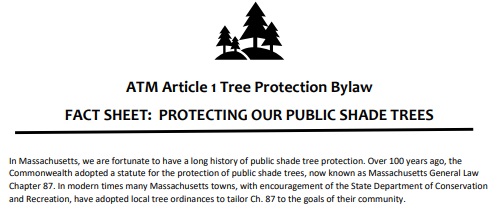Above: A proposed bylaw to protect trees wasn’t embraced by voters worried about interference with homeowner rights. (image cropped from fact sheet)
On Thursday night, residents questioned the process laid out by a proposed Tree Protection bylaw. Voters expressed concern that red tape would cause issue for homeowners. After 1½ hours of discussions, the Article was shot down by a clear majority.
Only 162 voters attended the Special Town Meeting last night. (That’s the lowest turnout for a Town Meeting in recent years.)* The Planning Board’s tree bylaw was the first Article tackled by the legislature.
Planning Board Chair Meme Luttrell presented the bylaw and fielded questions. She focused on the need to protect public shade trees. She highlighted that the trees in the public-right-of-way belong to all residents, not just the homeowners whose lawns they abut.
Luttrell asserted that the bylaw would simply codify and clarify the process by which the Town would comply with state laws. She stressed that it wouldn’t infringe on private property rights.
Some outspoken voters disagreed with both of those claims. (Many of those commenters were former members of the Select Board and Advisory Committee, well known to Town Meeting regulars.)
The Planning Board pursued the bylaw after hearing from many residents upset over the Town not following state laws for public shade trees. In recent years, residents complained about the lack of hearings and public process for tree removals. Planning member Debbie DeMuria spoke as a resident, noting that the bylaw was drafter prior to her joining the Board. She reminded the hall, the Town had removed some large (purportedly) healthy trees while leaving up a lot of dead trees.
The Board’s pitch for a bylaw has been to ensure the process agreed upon with the Select Board would continue to be followed in the future, avoiding another lapse. Commenters were more concerned that in the future the process would be held against residents, interfering with rights to protect their property and resulting in fines and/or increased costs.
In fact, other than supportive fellow members of the Planning Board, none of the commenters advocated for the bylaw as a necessary protection for trees.
One of the biggest objections was a requirement to get a permit for construction activities under the “drip line” of a tree that could disturb its roots. Luttrell explained that protecting the roots of the trees was important to maintaining their health and stability. The permit process would allow the Tree Warden Designee (a DPW employee) to “mitigate” harm to the tree roots. (The intent explained in prior meetings was for him to speak with homeowners about the projects and advise on ways to limit damage to the trees.)
Al Hamilton pointed out that the drip line extends onto private property. He followed that the claim that the bylaw wouldn’t impact private rights was untrue.
Residents asked about the potential of permits being rejected and worried about potential emergencies — like septic problems — that might not be able to wait for a permit.
Although Luttrell rejected that residents would be penalized under hypothetical scenarios thrown her way, many weren’t convinced. Mark Davis noted that while Luttrell said that “common sense” would prevail, the bylaw didn’t ensure it. He stated that future officials might interpret the bylaw differently. Davis also noted that trees at an angle can mean drip lines up to 60 feet into private property. He brought up the potential of permits interfering with aeration, sprinkler systems and other work.
John Butler highlighted an example of the bylaw processes going beyond the state laws. One of Planning’s proposed “clarifying” amendments to the Article named Planning as the Board that would promulgate the related public shade trees rules and regulations, including finds. Butler said that as the Town’s Tree Warden, the Select Board should have that designation.
Former Select Board member Bonnie Phaneuf agreed with Butler that some of the processes should fall under that Board.
Early in the discussion, Phaneuf proposed an amendment to make an exception to the permit requirements in the case of emergencies. Later she raised more questions about a legal complication on her property related to easements for utility poles. Dissatisfied with the answers, she announced that rather than amending the bylaw she was simply calling for it to fail.
Resident and developer John Bartolini opined that a bylaw wasn’t needed, just a good policy.
After the Article failed to pass, Planning member Marnie Hoolahan asked the hall to indefinitely postpone their next Article on Scenic Roads. She stated the reason as out of respect for time that night.
It’s worth noting that the Scenic Road bylaw was pitched as helping to reinforce the process for Tree protection on a long list of roads not currently designated scenic. The bylaw would have added them to the list. The Board may have decided that given the tone of the hall it made sense to reconsider their pitch or to simply save it for another night (and potentially additional voters).
*The second night of Annual Town Meeting this past spring may have had a lower turnout. (One vote count totaled 130 votes). But for the first night of an Annual or Special Town Meeting in the last four years, this was the lowest turnout. Except for the ATM in 2020 (which had 181 voters), meetings have been drawing in 200-250 voters.


